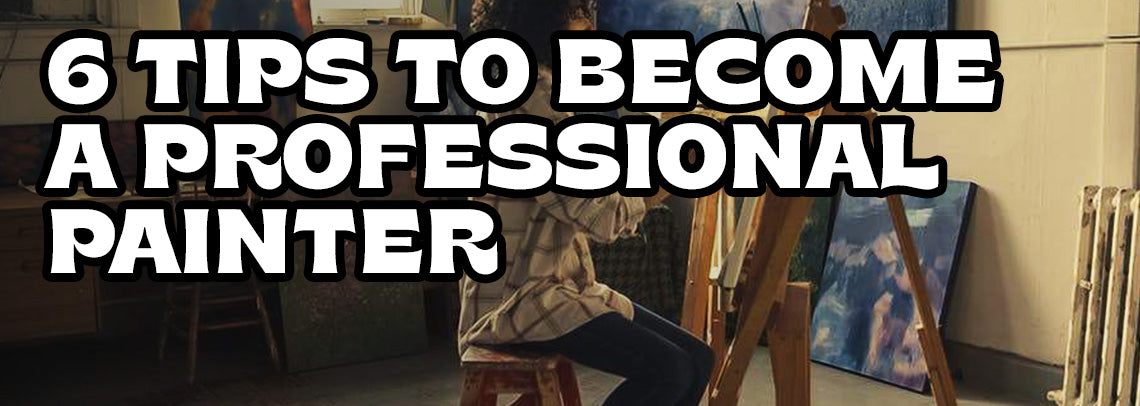Becoming a professional painter can be difficult. But you don't need to starve until you make it.
Sure, the path to professionalization isn't straightforward or predictable. However, there are plenty of strategies you can use to put your career on the right path.
Using these strategies still take work, but they can progress your career in a significant way.
So keep reading to learn more. Below, we'll cover six amazing tips on how to become a professional painter.
1. Constant Practice
Even the most well-respected artists in history develop their skills over time. All these artists have one thing in common — regular and diligent practice.
If you're an artist that's always compelled to create, then you probably don't need this tip. But regardless, every art professional knows that becoming one of the best painters in their industry is a time-consuming practice.
So set aside plenty of time every day for your craft. Sure, you probably already have a good sense of your style. But you'll find that devoting your day to your craft will enhance that style and fix any technical mistakes.
Don't rely on commissions and assignments to look for a reason to create, either.
You may want to practice painting with our canvases! Paint for fun, and you'll understand how to naturally tap into inspiration a lot more easily.

2. Build a Portfolio
Want to stand out in the art painting industry? Then you'll need to show people what makes your art special. To do that, you need to create a portfolio with some of your best works.
Otherwise, people will have a hard time believing that you've painted long enough to warrant payment. That's because any artist will have a few pieces to show with plenty of experience.
But it's not only about experience. People might have a specific vision and want to know if theirs align with yours. Whether you do commission-based work or are submitting an art gallery piece, artistic compatibility between the parties involved matters.
3. Speak to Other Professionals
You'll soon learn that painting art as a profession doesn't only involve the actual craft. It also involves networking and keeping in touch with other industry professionals.
This can be an exciting journey, as it lets you engage with other like-minded people. But it's also a necessary one, even if you're not a professional itself. Talking to professionals can help you develop your skills and your network.
If you really get along with an art expert, they might even agree to mentor you! This can be a huge stepping stone for your career, and offer you new opportunities.
4. Connect With Others on a Similar Journey
Before you develop enough seniority, trying to draw attention to your talents can be difficult and tiresome. But with a social circle of other artists, you can support each other and make the journey feel less lonesome.
This offers a different perk than one that involves artists with much more seniority. Many artists can become intimidated and hesitate to reach out. But even with enough self-confidence, getting someone's attention is still a challenge.
However, you might be much more comfortable collaborating with someone flourishing at a similar pace as you. You can offer each other tips and tricks to help you both navigate the industry, and uplift each other through any roadblocks.
5. Market Yourself Online
You don't need sales training to know the importance of advertising your work. Once again, it's difficult getting the attention of other industry professionals. But by gaining exposure, you can open your career up for different opportunities.
An online presence will be especially helpful for exposure. It can help your audience gain a cohesive understanding of your artistry, which might help you gain a loyal following.
That's because your feed isn't a substitute for your portfolio. While it can house your pieces, your feed is useful for other reasons too. Perhaps you want to demonstrate behind-the-scenes work or advertise an opportunity to work with other professionals!
Online marketing will also allow others who are seeking talented artists to give you lucrative professional activities. Having a profile also makes it easy for others to contact you, as some might want to start a conversation through casual messaging instead of formal emails.

6. Don't Sacrifice Your Dignity
As mentioned before, the professional art industry can get rough. Even the most talented artists might get brushed aside if they keep meeting the wrong people. But although rejection is almost inevitable, don't let that shake your faith in your own work.
Though some compromise is also inevitable, you should still have plenty of control over your professional artistic journey. Your vision should take priority, not others'. After all, the best art you'll make is art that you're truly inspired to create.
Don't let others push you and your time around, either. While freelancing offers an unpredictable schedule, that unpredictability should still be based on your own volition. Any mistakes and successes your make should be yours, and yours alone.
Essential Tips to Become a Professional Painter
Loving and creating art is one thing. But making a career out of it warrants its own journey. By using these tips to become a professional painter, you can give your art the attention it deserves and flourish!
At Hippie Crafter, we know how important great resources are for budding artists. That's why we offer some of the best art supplies for any painter perfecting their craft! So if you need quality paint supplies, check out our diverse painting supply catalog today.




